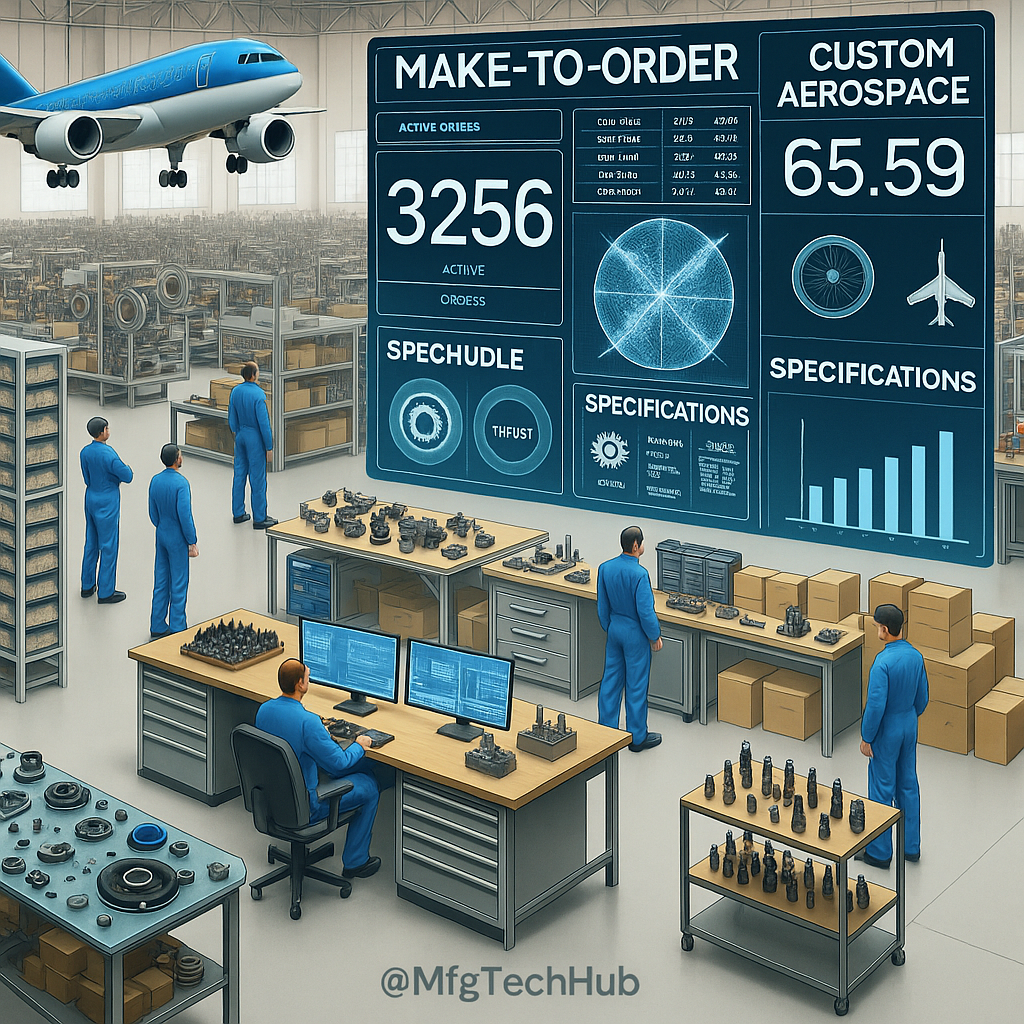MES Applications: Make-to-Order and Make-to-Stock
Introduction
Manufacturing Execution Systems (MES) serve as the backbone of modern manufacturing environments, bridging the gap between high-level planning systems and the realities of the shop floor. Their value becomes even more evident when applied to two of the most widely used production strategies: Make-to-Order (MTO) and Make-to-Stock (MTS). These models serve different business objectives and customer needs. MTO focuses on fulfilling specific customer requirements, emphasizing customization and flexibility, while MTS relies on producing goods in advance for immediate delivery, emphasizing efficiency and scale. MES adapts seamlessly to both approaches, providing real-time visibility, better resource utilization, and stronger quality assurance. This article explores how MES supports each model, their benefits, industry applications, and how organizations can leverage MES to balance customization and efficiency.
MES in Make-to-Order Manufacturing

Key Features
In MTO environments, production starts only after a confirmed customer order is received. This requires a high level of coordination between design, production, and delivery. MES ensures these requirements are met by offering the following capabilities:
- Custom Order Management: Tracks customer-specific requirements and ensures they are reflected at every stage of production, from raw material selection to final inspection.
- Real-Time Production Monitoring: Provides supervisors with real-time visibility into the progress of each order, helping identify bottlenecks and delays early.
- Dynamic Scheduling: Prioritizes urgent orders and reallocates resources in real time to meet tight delivery timelines.
- Traceability and Compliance: Monitors each step of production for regulatory adherence, a crucial factor in industries such as aerospace and pharmaceuticals.
- Integration with Enterprise Systems: Links with ERP and CRM platforms to ensure order specifications, customer data, and production capacity are always in sync.
Applications by Industry
- Aerospace: Producing highly customized components with rigorous regulatory requirements.
- Automotive: Managing special-edition vehicles or customer-specific features like interiors or engines.
- Industrial Equipment: Manufacturing one-off machinery tailored to specific client needs.
Benefits
MTO manufacturers benefit from MES by delivering on their promises while staying efficient:
- Improved ability to customize orders without disrupting operations.
- Higher customer satisfaction through accurate order tracking and timely delivery.
- Lower waste and optimized use of resources thanks to data-driven decision-making.
Example
An aerospace manufacturer integrates MES into its operations to handle custom orders for aircraft components. Each part is tracked from raw material input to assembly and inspection. The system ensures compliance with aviation standards while providing customers with real-time updates on order status. This leads to a 20% reduction in delivery lead times and improved trust between manufacturer and client.
MES in Make-to-Stock Manufacturing

Key Features
Unlike MTO, the MTS approach focuses on producing large volumes of goods ahead of time, based on demand forecasts. MES supports MTS by ensuring streamlined production, consistency, and optimized inventory control:
- Demand Forecasting Integration: Uses demand data and historical trends to fine-tune production volumes, avoiding shortages or overproduction.
- Batch Production Management: Tracks production runs, ensuring uniform quality and easy batch recall if needed.
- Quality Control: Automates inspection processes at each stage, minimizing defects before products reach consumers.
- Inventory Optimization: Keeps warehouse levels aligned with demand forecasts, ensuring neither stockouts nor excessive inventory costs.
- Scalability: Adapts to sudden increases or decreases in demand without straining resources.
Applications by Industry
- Consumer Goods: Producing cleaning supplies, personal care products, and household items in bulk.
- Food and Beverage: Large-scale production of snacks, packaged meals, or bottled drinks to meet supermarket demand.
- Pharmaceuticals: Producing common over-the-counter drugs and healthcare products in advance for immediate distribution.
Benefits
- Improved efficiency through standardized, large-scale production.
- Lower carrying costs by aligning production closely with inventory needs.
- Agility in responding to market demand, especially during seasonal peaks.
Example
A consumer goods company uses MES to oversee batch production of cleaning products. By integrating demand forecasts, MES schedules runs that align closely with market requirements. Real-time dashboards ensure that production matches warehouse capacity, reducing overproduction costs by 15% while maintaining high availability on retail shelves.
Comparing MTO and MTS with MES
Although MTO and MTS represent different production philosophies, MES demonstrates its versatility by excelling in both. Below is a side-by-side comparison:
| Feature | Make-to-Order (MTO) | Make-to-Stock (MTS) |
|---|---|---|
| Focus | Customization and flexibility | Efficiency and bulk production |
| Production Trigger | Begins after customer order is confirmed | Based on demand forecasts and planning |
| Inventory | Minimal, limited to specific orders | High, with bulk products stored for distribution |
| Key Benefit | High customer satisfaction and tailored products | Immediate market availability and fast delivery |
| MES Role | Real-time tracking, order-specific traceability, compliance | Batch management, efficiency monitoring, inventory control |
Conclusion
MES empowers both Make-to-Order and Make-to-Stock manufacturers by addressing their distinct challenges and helping them excel in their respective models. For MTO, MES delivers real-time customization, traceability, and enhanced compliance, ensuring that even the most complex customer orders are fulfilled with precision. For MTS, MES boosts efficiency, enables large-scale consistency, and optimizes inventory, giving manufacturers the agility to respond quickly to consumer demand.
In today’s competitive landscape, manufacturers rarely rely on one strategy exclusively. Many combine MTO and MTS approaches, using MES to maintain a delicate balance between customer-driven customization and market-driven efficiency. By implementing MES effectively, organizations not only streamline production but also future-proof themselves against shifting consumer demands and market uncertainties.
Ultimately, MES is not just a technology tool but a strategic enabler that ensures manufacturing organizations can deliver value, whether producing a single customized component or millions of consumer products for global markets.
